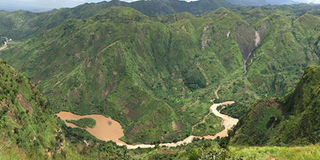147MW Ruzizi III project to boost regional power supply

The proposed 147MW Ruzizi III will be a run-of-river hydropower project along the River Ruzizi. PHOTO | COURTESY
What you need to know:
- The proposed 147 megawatts project, with an estimated cost of between Sh67 trillion and Sh72 trillion ($650m -$700m), is planned as a run-of-river hydropower project located on the River Ruzizi.
- Once commissioned, Ruzizi III will double Burundi’s current electricity capacity, increase Rwanda’s installed capacity by 33 percent and provide much needed base load power in eastern DRC, a region that is otherwise isolated from Congolese’s interconnected grid.
Kinshasa
The Aga Khan Fund for Economic Development through its industrial arm IPS and Norwegian renewable energy company, SN Power, have signed a project agreement with the governments of Burundi, Democratic Republic of Congo and Rwanda for the Ruzizi III hydropower project.
The proposed 147 megawatts project, with an estimated cost of between Sh67 trillion and Sh72 trillion ($650m -$700m), is planned as a run-of-river hydropower works located on the River Ruzizi.
River Ruzizi flows from Lake Kivu to Lake Tanganyika along the Rwanda and Burundi borders with DRC.
Speaking during the signing, Chief Executive Officer of IPS (K) Ltd, Mr Galeb Gulam, said that the project is the first privately financed project in sub-Saharan Africa that will utilise a common regional resource to generate power that will be shared equally between three countries.
“Despite the complexities and challenges that this region has faced, this project sets a unique precedent for public-private partnership projects globally,” he said.
AFFORDABLE POWER
Mr Gulam further said that the Ruzizi III project will contribute significantly to socio-economic development of the region through increasing access to reliable and affordable power to the millions living in the three countries.
Currently, the project is estimated to benefit 30 million people, a majority of whom are living below the poverty line.
Once commissioned, Ruzizi III will double Burundi’s current electricity capacity, increase Rwanda’s installed capacity by 33 percent and provide much needed base load power in eastern DRC, a region that is otherwise isolated from Congolese’s interconnected grid.
President and CEO of SN Power Erik Knive, who was also at the signing said that the project will generate clean and renewable power, reducing the region’s reliance on expensive thermal generation that currently costs in excess of US 35 cents (about Sh35) per kWh.
“It will also reduce the local communities’ dependence on wood fuel and charcoal; a major threat to the countries’ forests and biodiversity,” he added.
The project, expected to be operational in 2026, is structured as an Independent Power Project based on a Build, Own, Operate, Transfer structure and underpinned by a 25-year concession agreement and Power Purchase Agreements.
Concessional funding is expected to be provided by the Africa Development Bank, the European Investment Bank, the European Union, KfW Group, French Development Agency, and the World Bank, among others.




